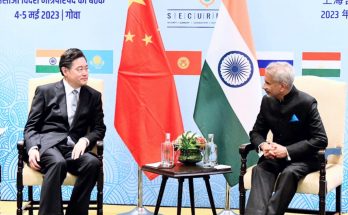 Amid a nearly two month old border standoff at the Doklam plateau, China’s propaganda and psychological warfare has acquired a new vehemence, especially when it comes to distorting Bhutan’s position in the protracted impasse between the two Asian giants.
Amid a nearly two month old border standoff at the Doklam plateau, China’s propaganda and psychological warfare has acquired a new vehemence, especially when it comes to distorting Bhutan’s position in the protracted impasse between the two Asian giants.
An editorial in China’s state-run Global Times headlined ‘Bhutan’s neutral stance embarrasses India’ (published on August 12) is the latest in the series of Beijing’s attempts at provoking India and confusing it and the Chinese audience over Thimphu’s stand, as internal power struggle intensify ahead of the 19th National Congress of the Communist Party of China.
The editorial came a day after India’s External Affairs Minister Sushma Swaraj had a bilateral meeting with her Bhutanese counterpart Damcho Dorji in Kathmandu on August 11, after which the latter told reporters, “We hope the current stand-off in Doklam will be sorted out peacefully. Both sides should be satisfied with outcome.’’ This statement has been interpreted by China as reflecting Bhutan’s “neutral stance” on Doklam.
Though there was no specific official word from the Indian side as to whether the Doklam issue came up for discussion between the two foreign ministers, India’s foreign office said that “all relevant bilateral issues were discussed ,’’ indicating that the issue was very much on the table, and it was confirmed by sources later.
The Chinese interpretation, however, showed that Beijing was determined to twist Bhutan’s position as part of its propaganda warfare against India. Recently, a senior foreign ministry official in Beijing claimed that Thimphu had accepted that that Doklam was part of the Chinese territory. This was in stark contrast to Bhutan’s official position, conveyed clearly on June 29. “Bhutan has conveyed to the Chinese side, both on the ground and through the diplomatic channel that the construction of the road inside the Bhutanese territory is a direct violation of the agreements and affects the process of demarcating the boundary between our two countries, Bhutan hopes that the status quo in the Doklam area will be maintained as before 16 June 2017.’’
Ever since the Indian troops’ intervention in Doklam, located at the tri-junction of India, China and Bhutan in the Sikkim sector, China has launched a war of nerves on India, coming out almost every day with a threat to make India blink, but New Delhi has refused to be provoked and has repeatedly stressed that the resolution of the crisis should be found through diplomatic means.
Against this backdrop, China’s bid to misrepresent Bhutan’s position is designed to sow fissures between India and Bhutan, which enjoy close and special friendship, and to mislead the international community. These tactics, said sources in New Delhi, will not work. Amid a hostile propaganda blitz launched by the powers-that-be I Beijing, India has shown a steely resolve by refusing to be intimidated by China’s pressure tactics. The only solution, as New Delhi has reminded Beijing again and again, is for both sides to take a big-picture view of the larger India-China relationship and resolve the Doklam issue through diplomacy.
Author Profile
- India Writes Network (www.indiawrites.org) is an emerging think tank and a media-publishing company focused on international affairs & the India Story. Centre for Global India Insights is the research arm of India Writes Network. To subscribe to India and the World, write to editor@indiawrites.org. A venture of TGII Media Private Limited, a leading media, publishing and consultancy company, IWN has carved a niche for balanced and exhaustive reporting and analysis of international affairs. Eminent personalities, politicians, diplomats, authors, strategy gurus and news-makers have contributed to India Writes Network, as also “India and the World,” a magazine focused on global affairs.
Latest entries
 DiplomacyApril 23, 2024Resetting West Asia, re-booting the world, but not fast enough: T.S. Tirumurti
DiplomacyApril 23, 2024Resetting West Asia, re-booting the world, but not fast enough: T.S. Tirumurti India and the WorldApril 22, 2024India’s G20 Legacy: Mainstreaming Africa, Global South in global agenda
India and the WorldApril 22, 2024India’s G20 Legacy: Mainstreaming Africa, Global South in global agenda DiplomacyApril 10, 2024Diplomat-author Lakshmi Puri pitches for women power at LSR
DiplomacyApril 10, 2024Diplomat-author Lakshmi Puri pitches for women power at LSR India and the WorldApril 6, 2024UN envoy pitches to take India’s solutions to the world stage
India and the WorldApril 6, 2024UN envoy pitches to take India’s solutions to the world stage







